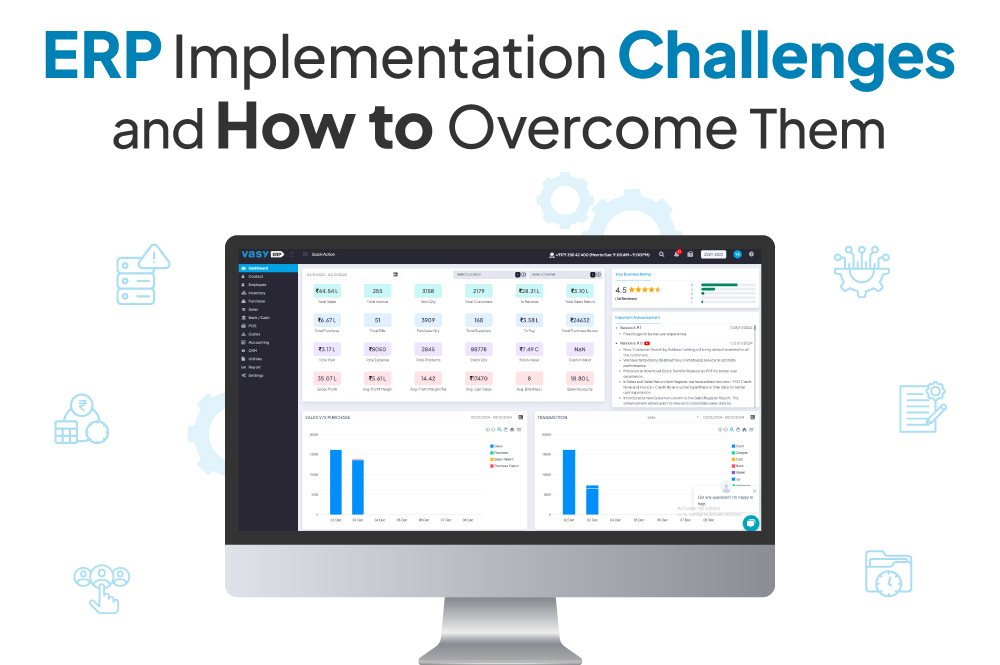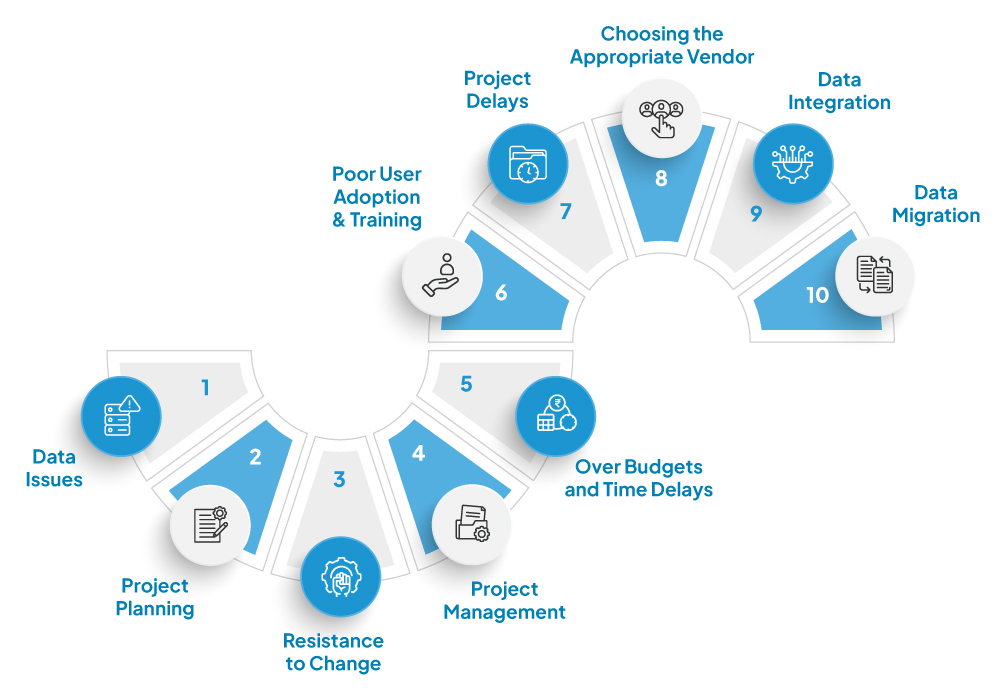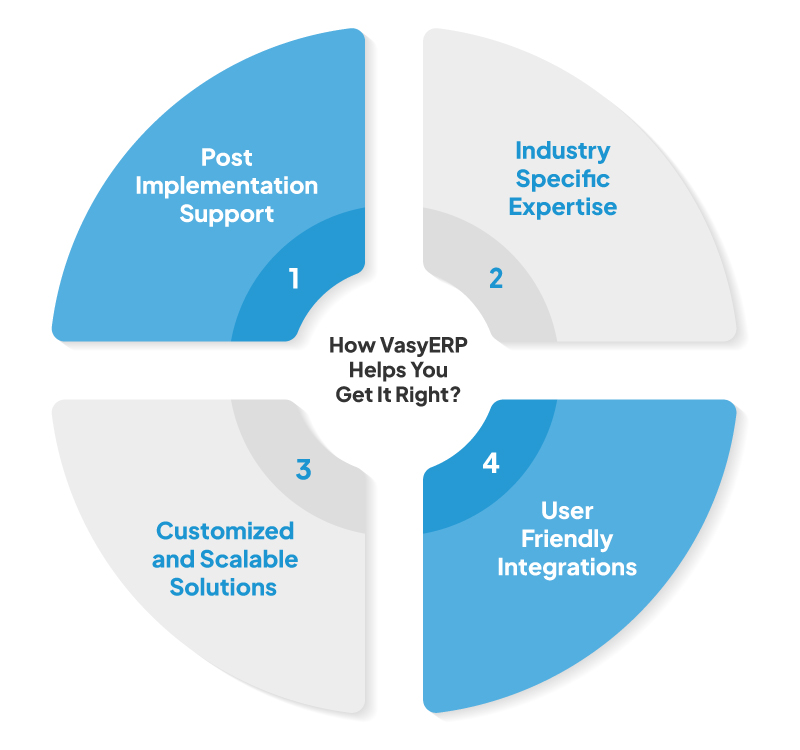ERP Implementation Challenges and How to Overcome Them
May 21, 2025

ERP implementation is a critical phase for any growing organization. Businesses these days face a tough challenge while selecting the best ERP software. The best ERP software for business integrates multiple business operations, including finance, supply chain management, inventory management, customer relationship management, and human resource all into a single platform. With the increasing popularity of cloud-based ERP solutions, companies have access to new opportunities for accessibility, scalability and flexibility.
Enterprise resource planning is a software used by businesses or organizations to manage everyday business activities from a single dashboard using the capabilities of cloud, AI and machine learning (ML). ERP software applications integrate all the processes and offer real-time insights to optimize processes from any location.
Several ERP software applications are important to businesses as they integrate all the procedures required to operate their organizations, assisting them in implementing resource planning. The best ERP software for business delivers advanced features including customized deployments, privacy and security, easy functioning, automations, apps integration, and software customizations.
The market for enterprise resource planning (ERP) is expected to reach USD 85842.11 million by 2028, with a compound annual growth rate (CAGR) of 8.85% from its estimated USD 51612.18 million in 2022.
ERP software has multiple use cases for any industry, including aligning cross-functional collaboration, avoiding data silos, and improving workflows in the process.
Enterprise resource planning (ERP) software is a valuable investment with potentially high ROI. The advantages of ERP range from reduced operational costs to enhanced customer satisfaction. A robust ERP boosts business efficiency and helps in data-driven decision-making by centralizing analytics, data, and other admin processes.

A comprehensive ERP system simplifies multiple tasks that fulfill client requirements. ERP’s e-commerce modules help to enhance communication skills and order tracking. CRM features in VasyERP software allow companies to better understand client requirements and customize interactions.
ERP features strong data security. Several systems offer malware protection, automatic backups, and data encryption. An ERP centralizes data and administration tools rather than monitoring data collection processes and permitting access over several software systems.
The main reason businesses implement enterprise software is the requirement to access real-time data. As per the study, ERP analytics allow businesses to identify trends, anomalies and patterns and use the data to optimize operations, enhance efficiency, reduce costs, and boost profitability. Executives can monitor operational and financial KPIs from a single platform rather than searching across various platforms for information.
VasyERP’s software helps with supply chain management for distributors and manufacturers. According to research, 90% of distribution and manufacturing industries are benefited with complete interaction with suppliers. In order to analyze real-time data, modern ERPs prefer to use Artificial Intelligence. The software program can forecast changes in demand and recommend routes for transportation. Real-time metrics allow you to react better to possible disruptions or changes in the market.
The main benefits of ERP software include increased productivity and efficiency. Also, automation is the most important function of ERP. It allows employees to use less resources and to accomplish more work. Reducing the amount of human data entry can quickly complete projects with precision and accuracy. Also, managers can save time in identifying and correcting errors.
The ERP implementation is a complicated process that includes optimizing business operations, configuring the software, transferring data, and educating staff on utilizing the new system. It takes a few months to finish and involves precise setup and planning. To select the best ERP, businesses must evaluate their current procedures, specify their expectations for the system, and get a clear understanding of their requirements. Successful ERP implementation needs precise planning and preparation.
Transitioning to an Cloud-based ERP can be difficult since it requires a change from manual to automated processes. An ERP system helps departments like finance, HR, sales, and manufacturing to operate more effectively by centralizing various corporate activities.
ERP software directly affects inventory management, data security, business operations, and much more, making it more difficult for companies to adapt. To optimize and align operations, employees must accept the challenges in implementing ERP software solutions. The companies must ensure to select an ERP software carefully as it pre-planned long-term strategy.
ERP is meant to be the ultimate solution for all the retail store operations and it must replace all the other tools being used in the business from creating orders to billing processes. VasyERP’s software provides users with strong project management, all-time support from experts, and a dedicated team for the ERP implementation. The ERP software will fulfill the goals and perform all the business operations without affecting the data quality or the management.
However, there are multiple challenges in implementing successful ERP, which includes accurate navigation and strategic solutions. In this guide, we will examine several challenges while implementing ERP in cloud-based software solutions.
An appropriate ERP implementation involves technology and people. Hence, it encounters both technological and human-related difficulties, like resistance to change. The most common top 10 ERP challenges include:

Challenge
Data problems such as missing data or inaccurate data, duplicate data or inconsistent data can hinder the integrity and dependability of the ERP system. Poor data quality can alter decision-making processes, affect process automation, and reduce user confidence in the system.
Solution
To ensure consistency,completeness, and accuracy, data quality must be the primary focus of the ERP implementation. Also, users must leverage data validation and data cleansing techniques to find and fix mistakes, discrepancies, and abnormalities in the data. Develop data governance strategies and practices to promote data integrity and compliance, usage, and guidelines to control data generation. Use data quality measurements and data profiling tools to enhance and monitor data consistency.
Challenge
Poor project planning in ERP implementation delivers multiple challenges including time delays, over budgets, insufficient resource allocation, and alters overall business progress.
Solutions
Businesses must spend time and money on accurate project planning and define project aim, scope, results, deadlines, and resource requirements. Gather and monitor requirements thoroughly to explore the demands of stakeholder, system functions and business processes. Get detailed project plans, including Gantt charts, resource schedule, and work breakdown structure (WBS) to create a proper guideline for project execution and track progress. Occupy important stakeholders throughout the planning process and ensure aligned and incorporate feedback to redesign project plans as required.
Challenge
Employee resistance is the biggest challenge these days. This happens because of worries regarding the job security, workflow hindrances, or a lack of expertise and experience with the new technology. By guiding employees from the first stage, discussing their concerns, and offering appropriate support and knowledge, businesses can simplify the transition process and deliver a more positive response.
Solution
Adaption to change management is important for overcoming resistance. Businesses must train and educate employees through comprehensive training programs and communication regarding the benefits of the VasyERP’s ERP software solutions. A more seamless transition process and enhanced decision-making are the outcomes of educating employees and addressing their concerns.
Challenge
ERP implementation includes multiple steps: discovery and planning, designing and development, data migration, deployment, testing, support and post-launch maintenance and updates. Each step includes challenging tasks, and the factors required to complete the project successfully. However, successful project implementation requires the presence of all the teams in developing and leveraging the system. This is a challenging task as every department is busy resolving their own issues with ERP projects.
Solution
Implementation of scalable and modern project management methods to plan, execute, and monitor ERP implementation projects accurately. Set a clear goal, scope, and deadlines, and assign resources effectively to ensure project success. Also, allow transparent communication and collaboration among business project stakeholders, including users, IT teams, executives, and vendors to simplify project streamlining and reduce project risks. Perform regular project reviews and post-launch assessments to understand project performance and highlight the areas of enhancements.
Challenge
ERP implementation sometimes results in over budgets and time delays because of unexpected challenges, inappropriate planning, and resource limitations.
Solution
Proper planning, reduced risk assessments, and effective project management are required to control budget and risks. Creating proper implementation plans with real-time timelines, resource allocations provide more clarity and accountability. Staying on the track will require implementation of strong control techniques that manage project’s growth and perform progress reviews to spot and fix any possible issues.
Challenge
To ensure that every user is aware of the responsibility and the difficulties of the new ERP system, thorough user training is important throughout the entire ERP implementation. Inadequate training leads to this problem, resulting in reduced productivity and frustrated users.
Solution
Make training and user engagement a top priority to encourage the ERP’s successful adoption. Develop thorough training courses through user manuals, online courses, and tutorials that fit particular requirements of multiple roles and departments. Also, firms must consider giving workshops, courses, and practical training sessions to train users regarding the functioning of the ERP software. To enhance user adoption, get user inputs to find the training gaps and adjust training programs accordingly.
Challenge
ERP implementation projects might face delays because of multiple factors including project goal change, resource restrictions, unexpected technical errors, or relying on certain vendors. Delays cause disruptions in timelines, increases cost, and affects organizations overall productivity and scalability.
Solution
Leveraging certain project management methods including Waterfall or Agile, helps to manage project deadlines and reduces delays. Also, conducting risk assessments and effective planning to identify delays and create strategies to get rid of delays. Develop transparent communication channels and notify stakeholders regarding project progress and concerns to reduce disruptions.
Challenge
ERP vendors typically promise to deliver all the features in ERP software, which makes choosing an appropriate vendor difficult. Conduct through research, list down clear criterias that are aligned with business goals, involve important stakeholders in the review process, and get full proposals from all the ERP vendors. Furthermore, performing reference checks and negotiating contracts contributes to successful collaboration.
Solution
VasyERP’s software solutions have all the features covered including inventory management, business reports and and analytics, interactive dashboard, third-party integrations, V-Checkout, V-Pay, etc. required by the small retailers or organizations. Business owners can freely contact the experts at VasyERP to get the details regarding the ERP installation and implementation for their particular business.
Challenge
There will be a number of difficulties when integrating data from several systems and sources into the ERP platform. These include complicated data mapping, inconsistent data formats, and problems with data synchronization.
Solution
Leverage industry-standard integration technologies and protocols, including ETL (Extract, Transform, Load) tools, APIs, and middleware solutions to implement a methodical approach to data integration. To streamline data structures and semantics among source systems and ERP platforms, businesses must consider performing comprehensive data mapping.
To ensure data accuracy and data consistency across interconnected systems, put data validation and reconciliation procedures into place. To develop and execute a data integration solution that satisfies the demands and goals of the business, coordinate properly with vendors, data integration experts, and business stakeholders.
Challenge
The process of migrating old data to the new ERP platform is a difficult task as it includes incorrect data formats, problems with the data integrity, and duplicate entries. Inadequate preparation and execution might lead to data migration mistakes that compromise the implementation’s overall success.
Solution
Using data migration techniques and technologies can reduce risks and expedite the process. To guarantee data integrity, it is crucial to standardize data formats, apply data cleansing methods, and carry out comprehensive data audits to find discrepancies. Thorough testing and trail migrations assists in locating and resolving problems prior to full-scale deployment
At VasyERP, we do not just install ERP softwares but partner with you for every stage from planning to training and post-implementation support.
Below are the ways in which VasyERP can help you implement ERP in business in right way:

VasyERP’s technical experts are always ready to support and offer technical assistance even after the successful installation of the ERP software.
We have multiple clients in different industries including manufacturing, retail, etc. and hence we understand the challenges in implementing ERP software in your industry and also have experience in how to resolve them quickly.
VasyERP’s ERP software is highly customized and you can add new features according to your business requirement. From POS to inventory and CRM, our experts are always available to guide you through software installation and customization.
Our experts are aware about challenges in integrating the existing software with VasyERP’s software. Hence, we have developed ERP software that makes third-party integrations simple and hassle-free. Whether you are a retailer or a technical person, get our software solutions installed and implemented easily.
Selecting the appropriate ERP vendor is important as choosing the right software solutions. With VasyERP, you can experience:
It takes open communication, collaboration, and effective planning to overcome the challenging tasks in implementing cloud-based ERP software. Businesses can leverage total benefits of ERP software by using VasyERP’s smart ERP solutions to overcome the obstacles. Companies can successfully deploy cloud-based ERP solutions that offer operational efficiency, competitive-edge, scalability and agility with appropriate planning and navigation.
Let VasyERP make ERP implementation simple and stress-free for your business
Talk to our experts and schedule a free demo!

We all know that businesses are now working hard to tra...
July 11, 2023

Enterprise Resource Planning (ERP) is a software applic...
January 27, 2025
